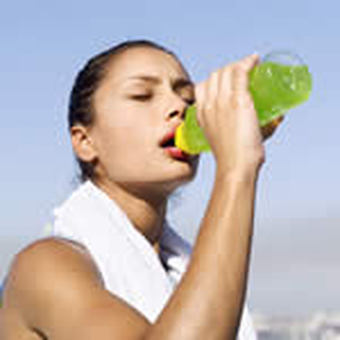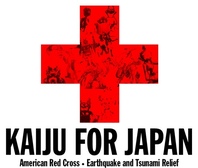
By Matt Fitzgerald
For Active.com
Unless you've been living in a cave, you've probably seen those television advertisements in which a leading sports drink maker claims its product "hydrates better than water." The fact that the message of these ads hasn't changed in many years suggests that a lot of athletes aren't buying it. But it's actually true.Why do sports drinks hydrate better than water? There are three reasons. First, fluids are absorbed through the gut and into the bloodstream faster when their osmolalityclosely matches that of body fluids such as blood.
Osmolality is the concentration of dissolved particles in a fluid. Sports drinks contain dissolved minerals (sodium, etc.) and carbohydrates, whereas water doesn't, so water doesn't reach the bloodstream as quickly.
Sodium and other nutrients also play important roles in regulating fluid balance in the body. In other words, they help determine how much fluid enters into muscle fibers and other cells, how much remains in the blood, and so forth. Again, because sports drinks contain these nutrients, they do a better job of allowing the body to maintain optimal fluid balance, which is an important aspect of hydration that few athletes consider.
A third advantage of sports drinks over water with respect to hydration is that the sodium content of sports drinks stimulates thirst, so athletes usually drink more when they have a sports drink than when they have plain water.
Choosing the Right Sports Drink
Not all sports drinks hydrate equally. Those that contain higher amounts of sodium are preferable, because they are absorbed quicker and maintain fluid balance in the blood and muscles better. Choose a sports drink that contains at least 15 mg of sodium per ounce.
New research suggests that sports drinks containing a small amount of protein may also hydrate better than conventional sports drinks. Protein is an often-overlooked nutrient that affects osmolality just as minerals and carbs do. Therefore the addition of protein to a sports drink has the potential to increase its absorption rate.
This was demonstrated in a recent study by exercise physiologists at San Antonio Catholic University in Murcia, Spain, and published in the Spanish Journal of Nuclear Medicine.
Twenty-four well-trained cyclists participated in the study. They were fed either of two sports drinks at rest and during a workout. Drink A was a conventional sports drink containing 15 grams of carbohydrate per 100 ml. Drink B contained 10 grams of carbohydrate per 100 ml plus proteins.
After 60 minutes of exercise, the researchers found that a significantly greater amount of drink B, containing carbs and protein, had been absorbed than drink A. These results indicate that a carb-protein sports drink may hydrate better than a conventional sports drink.
The addition of protein to a sports drink appears also to aid fluid retention. When a beverage is too dilute, it tends to pass quickly through the bloodstream to the bladder so it doesn't "water down" the blood and other body fluids.
New evidence suggests that the right amount of protein in a sports drink, in combination with the right amount of carbs and electrolytes, may boost fluid retention and help you hydrate better during exercise.
In a new study from St. Cloud State University, cyclists exercised until they lost two percent of their body weight and then consumed one of three beverages: a sports drink containing carbohydrate and protein in a 4:1 ratio; a conventional sports drink containing carbs and electrolytes but no protein; or water.
Over the next three hours, the investigators measured how much of each beverage was retained. Only 53 percent of the water was retained, versus 75 percent of the conventional sports drink and an amazing 88 percent of the carb-protein sports drink.
Other Advantages of Sports Drinks
Sports drinks have other advantages over water for athletes and exercisers that go beyond better hydration. Specifically, the calories in sports drinks have been shown to increase energy and endurance, limit the immune system suppression that sometimes follows hard workouts, reduce exercise-induced muscle damage, and promote faster recovery.
Water is by far the most popular fluid choice during exercise. However, sports drinks actually do a better job of hydration, while also providing other benefits that water does not. Water is a great drink choice outside of workouts, but during exercise you're much better off with a sports drink. In this case, there's truth in advertising.
This article was adapted by the author from The Cutting-Edge Runner: How to Use the Latest Science and Technology to Run Longer, Stronger, and Faster (Rodale). Clickhere to purchase a copy.
http://www.active.com/running/Articles/Which_fluid_hydrates_best__Water_or_a_sports_drink_.htm?cmp=17-7-313
For Active.com
Unless you've been living in a cave, you've probably seen those television advertisements in which a leading sports drink maker claims its product "hydrates better than water." The fact that the message of these ads hasn't changed in many years suggests that a lot of athletes aren't buying it. But it's actually true.Why do sports drinks hydrate better than water? There are three reasons. First, fluids are absorbed through the gut and into the bloodstream faster when their osmolalityclosely matches that of body fluids such as blood.
Osmolality is the concentration of dissolved particles in a fluid. Sports drinks contain dissolved minerals (sodium, etc.) and carbohydrates, whereas water doesn't, so water doesn't reach the bloodstream as quickly.
Sodium and other nutrients also play important roles in regulating fluid balance in the body. In other words, they help determine how much fluid enters into muscle fibers and other cells, how much remains in the blood, and so forth. Again, because sports drinks contain these nutrients, they do a better job of allowing the body to maintain optimal fluid balance, which is an important aspect of hydration that few athletes consider.
A third advantage of sports drinks over water with respect to hydration is that the sodium content of sports drinks stimulates thirst, so athletes usually drink more when they have a sports drink than when they have plain water.
Choosing the Right Sports Drink
Not all sports drinks hydrate equally. Those that contain higher amounts of sodium are preferable, because they are absorbed quicker and maintain fluid balance in the blood and muscles better. Choose a sports drink that contains at least 15 mg of sodium per ounce.
New research suggests that sports drinks containing a small amount of protein may also hydrate better than conventional sports drinks. Protein is an often-overlooked nutrient that affects osmolality just as minerals and carbs do. Therefore the addition of protein to a sports drink has the potential to increase its absorption rate.
This was demonstrated in a recent study by exercise physiologists at San Antonio Catholic University in Murcia, Spain, and published in the Spanish Journal of Nuclear Medicine.
Twenty-four well-trained cyclists participated in the study. They were fed either of two sports drinks at rest and during a workout. Drink A was a conventional sports drink containing 15 grams of carbohydrate per 100 ml. Drink B contained 10 grams of carbohydrate per 100 ml plus proteins.
After 60 minutes of exercise, the researchers found that a significantly greater amount of drink B, containing carbs and protein, had been absorbed than drink A. These results indicate that a carb-protein sports drink may hydrate better than a conventional sports drink.
The addition of protein to a sports drink appears also to aid fluid retention. When a beverage is too dilute, it tends to pass quickly through the bloodstream to the bladder so it doesn't "water down" the blood and other body fluids.
New evidence suggests that the right amount of protein in a sports drink, in combination with the right amount of carbs and electrolytes, may boost fluid retention and help you hydrate better during exercise.
In a new study from St. Cloud State University, cyclists exercised until they lost two percent of their body weight and then consumed one of three beverages: a sports drink containing carbohydrate and protein in a 4:1 ratio; a conventional sports drink containing carbs and electrolytes but no protein; or water.
Over the next three hours, the investigators measured how much of each beverage was retained. Only 53 percent of the water was retained, versus 75 percent of the conventional sports drink and an amazing 88 percent of the carb-protein sports drink.
Other Advantages of Sports Drinks
Sports drinks have other advantages over water for athletes and exercisers that go beyond better hydration. Specifically, the calories in sports drinks have been shown to increase energy and endurance, limit the immune system suppression that sometimes follows hard workouts, reduce exercise-induced muscle damage, and promote faster recovery.
Water is by far the most popular fluid choice during exercise. However, sports drinks actually do a better job of hydration, while also providing other benefits that water does not. Water is a great drink choice outside of workouts, but during exercise you're much better off with a sports drink. In this case, there's truth in advertising.
This article was adapted by the author from The Cutting-Edge Runner: How to Use the Latest Science and Technology to Run Longer, Stronger, and Faster (Rodale). Clickhere to purchase a copy.
http://www.active.com/running/Articles/Which_fluid_hydrates_best__Water_or_a_sports_drink_.htm?cmp=17-7-313

 RSS Feed
RSS Feed







